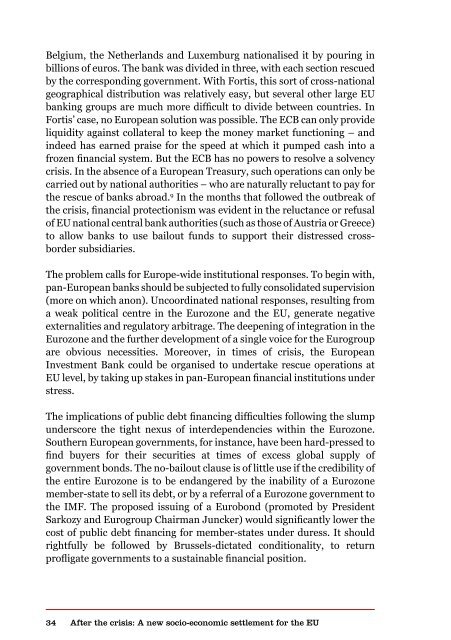Authors Iain Begg | Gabriel Glöckler | Anke Hassel ... - The Europaeum
Authors Iain Begg | Gabriel Glöckler | Anke Hassel ... - The Europaeum
Authors Iain Begg | Gabriel Glöckler | Anke Hassel ... - The Europaeum
You also want an ePaper? Increase the reach of your titles
YUMPU automatically turns print PDFs into web optimized ePapers that Google loves.
Belgium, the Netherlands and Luxemburg nationalised it by pouring in<br />
billions of euros. <strong>The</strong> bank was divided in three, with each section rescued<br />
by the corresponding government. With Fortis, this sort of cross-national<br />
geographical distribution was relatively easy, but several other large EU<br />
banking groups are much more difficult to divide between countries. In<br />
Fortis’ case, no European solution was possible. <strong>The</strong> ECB can only provide<br />
liquidity against collateral to keep the money market functioning – and<br />
indeed has earned praise for the speed at which it pumped cash into a<br />
frozen financial system. But the ECB has no powers to resolve a solvency<br />
crisis. In the absence of a European Treasury, such operations can only be<br />
carried out by national authorities – who are naturally reluctant to pay for<br />
the rescue of banks abroad. 9 In the months that followed the outbreak of<br />
the crisis, financial protectionism was evident in the reluctance or refusal<br />
of EU national central bank authorities (such as those of Austria or Greece)<br />
to allow banks to use bailout funds to support their distressed crossborder<br />
subsidiaries.<br />
<strong>The</strong> problem calls for Europe-wide institutional responses. To begin with,<br />
pan-European banks should be subjected to fully consolidated supervision<br />
(more on which anon). Uncoordinated national responses, resulting from<br />
a weak political centre in the Eurozone and the EU, generate negative<br />
externalities and regulatory arbitrage. <strong>The</strong> deepening of integration in the<br />
Eurozone and the further development of a single voice for the Eurogroup<br />
are obvious necessities. Moreover, in times of crisis, the European<br />
Investment Bank could be organised to undertake rescue operations at<br />
EU level, by taking up stakes in pan-European financial institutions under<br />
stress.<br />
<strong>The</strong> implications of public debt financing difficulties following the slump<br />
underscore the tight nexus of interdependencies within the Eurozone.<br />
Southern European governments, for instance, have been hard-pressed to<br />
find buyers for their securities at times of excess global supply of<br />
government bonds. <strong>The</strong> no-bailout clause is of little use if the credibility of<br />
the entire Eurozone is to be endangered by the inability of a Eurozone<br />
member-state to sell its debt, or by a referral of a Eurozone government to<br />
the IMF. <strong>The</strong> proposed issuing of a Eurobond (promoted by President<br />
Sarkozy and Eurogroup Chairman Juncker) would significantly lower the<br />
cost of public debt financing for member-states under duress. It should<br />
rightfully be followed by Brussels-dictated conditionality, to return<br />
profligate governments to a sustainable financial position.<br />
34<br />
After the crisis: A new socio-economic settlement for the EU

















